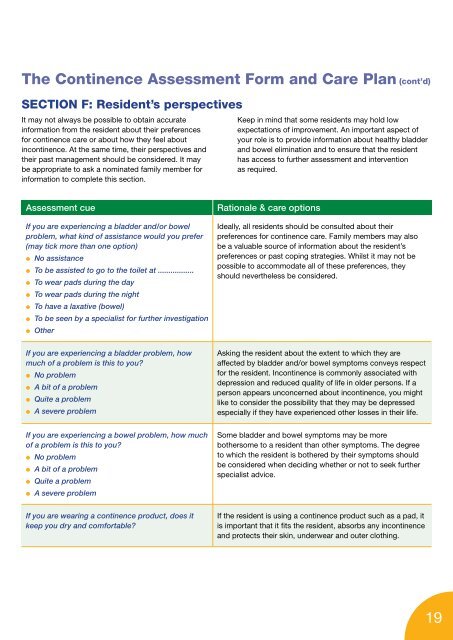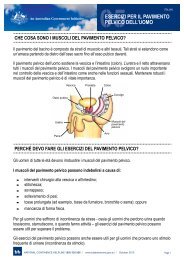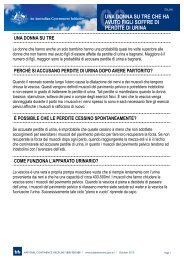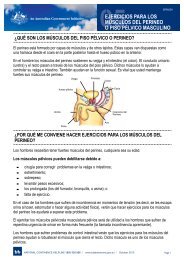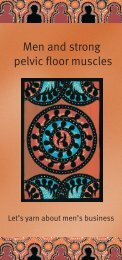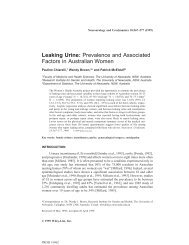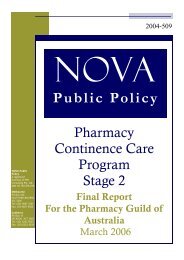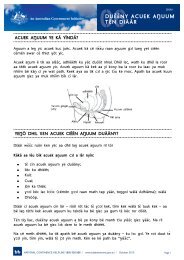Continence Tools for Residential Aged Care - Bladder and Bowel ...
Continence Tools for Residential Aged Care - Bladder and Bowel ...
Continence Tools for Residential Aged Care - Bladder and Bowel ...
Create successful ePaper yourself
Turn your PDF publications into a flip-book with our unique Google optimized e-Paper software.
The <strong>Continence</strong> Assessment Form <strong>and</strong> <strong>Care</strong> Plan (cont’d)<br />
SECTION F: Resident’s perspectives<br />
It may not always be possible to obtain accurate<br />
in<strong>for</strong>mation from the resident about their preferences<br />
<strong>for</strong> continence care or about how they feel about<br />
incontinence. At the same time, their perspectives <strong>and</strong><br />
their past management should be considered. It may<br />
be appropriate to ask a nominated family member <strong>for</strong><br />
in<strong>for</strong>mation to complete this section.<br />
Assessment cue Rationale & care options<br />
If you are experiencing a bladder <strong>and</strong>/or bowel<br />
problem, what kind of assistance would you prefer<br />
(may tick more than one option)<br />
● No assistance<br />
● To be assisted to go to the toilet at .................<br />
● To wear pads during the day<br />
● To wear pads during the night<br />
● To have a laxative (bowel)<br />
● To be seen by a specialist <strong>for</strong> further investigation<br />
● Other<br />
If you are experiencing a bladder problem, how<br />
much of a problem is this to you?<br />
● No problem<br />
● A bit of a problem<br />
● Quite a problem<br />
● A severe problem<br />
If you are experiencing a bowel problem, how much<br />
of a problem is this to you?<br />
● No problem<br />
● A bit of a problem<br />
● Quite a problem<br />
● A severe problem<br />
If you are wearing a continence product, does it<br />
keep you dry <strong>and</strong> com<strong>for</strong>table?<br />
Keep in mind that some residents may hold low<br />
expectations of improvement. An important aspect of<br />
your role is to provide in<strong>for</strong>mation about healthy bladder<br />
<strong>and</strong> bowel elimination <strong>and</strong> to ensure that the resident<br />
has access to further assessment <strong>and</strong> intervention<br />
as required.<br />
Ideally, all residents should be consulted about their<br />
preferences <strong>for</strong> continence care. Family members may also<br />
be a valuable source of in<strong>for</strong>mation about the resident’s<br />
preferences or past coping strategies. Whilst it may not be<br />
possible to accommodate all of these preferences, they<br />
should nevertheless be considered.<br />
Asking the resident about the extent to which they are<br />
affected by bladder <strong>and</strong>/or bowel symptoms conveys respect<br />
<strong>for</strong> the resident. Incontinence is commonly associated with<br />
depression <strong>and</strong> reduced quality of life in older persons. If a<br />
person appears unconcerned about incontinence, you might<br />
like to consider the possibility that they may be depressed<br />
especially if they have experienced other losses in their life.<br />
Some bladder <strong>and</strong> bowel symptoms may be more<br />
bothersome to a resident than other symptoms. The degree<br />
to which the resident is bothered by their symptoms should<br />
be considered when deciding whether or not to seek further<br />
specialist advice.<br />
If the resident is using a continence product such as a pad, it<br />
is important that it fits the resident, absorbs any incontinence<br />
<strong>and</strong> protects their skin, underwear <strong>and</strong> outer clothing.<br />
19


